David Koch May Have Taken Us All With Him
The billionaire philanthropist leaves behind a devastating legacy of climate denial, argues author and Penn State professor Michael Mann.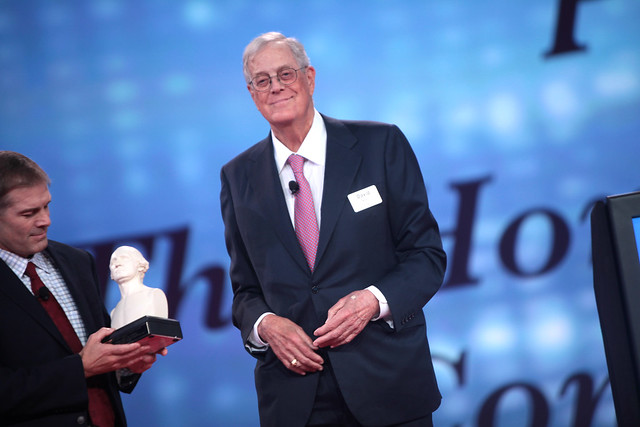 Billionaire philanthropist David Koch died at 79 earlier this week. (Gage Skidmore / Flickr)
Billionaire philanthropist David Koch died at 79 earlier this week. (Gage Skidmore / Flickr)
What follows is a conversation between professor Michael Mann and Dharna Noor of The Real News Network. Read a transcript of their conversation below or watch the video at the bottom of the post.
DHARNA NOOR: It’s The Real News. I’m Dharna Noor.
David Koch is dead. The conservative billionaire industrialist passed away at age 79 on Thursday after a battle with advanced prostate cancer. Koch and his brother, Charles, of course ran Koch Industries, a fossil fuel conglomerate that’s one of America’s largest private companies. David was the socialite, philanthropist brother. He ran a charitable foundation, and as many obituaries are quick to note, he donated some $1.3 billion to medical research and arts and cultural institutions like The Met and other causes. But I think it’s fair to say that that legacy pales in comparison to his impact on the climate crisis. David Koch helped funnel billions of dollars into climate denialism.
I’m joined now to talk about this with somebody who knows this impact firsthand. Michael Mann is a seminal climate scientist, perhaps best known for his work on the hockey stick graph. He’s a Distinguished Professor of Atmospheric Science at Penn State, and he’s the author of several books, including the most recent, The Tantrum that Saved the World, which is a children’s book on climate change, which he co-authored with Megan Herbert. Thank you so much for being with us today.
MICHAEL MANN: Thank you. It’s great to be with you.
DHARNA NOOR: So Michael, for viewers who don’t know, of course, 20 years ago, you discovered that temperatures had risen by 1.4 degrees Fahrenheit since the late 1800s, and two-thirds of that warming happened since 1975. You just went through a crazy lawsuit with a climate-denying scientist, Tim Ball, about your work on that famous hockey stick graph, but that wasn’t the first time that you caught heat for that, right? In 2005, a Koch-funded Congressperson attacked that work, and then, you were the subject of this crazy smear campaign led by Koch Industries. What exactly happened there, and why did they see your work as so dangerous, as such a threat?
MICHAEL MANN: Yeah. Well, I did catch heat— no pun intended— for the work that we did now two decades ago in publishing the hockey stick curve. It’s an estimate of how temperatures have varied over the past thousand years, and it became sort of an icon in the climate change debate, and I found myself in the center of attacks by the climate change denial machine— the fossil fuel industry and indeed the Koch-funded attack machine— aimed at discrediting the work of scientists like myself to try to forestall action on climate. So I’ve been enduring that for nearly two decades now, but it has been an opportunity. It’s not what I signed up for when I decided to double major in math and physics and go on to study the modeling of the earth’s climate system, but because I did ultimately find myself at the center of the very fractious debate over climate change, I’ve embraced the role that that gives me to inform this very important discussion.
You mentioned this lawsuit that was dismissed. So I’ve often been subject to defamation by climate change deniers. In this case, Tim Ball, a Canadian climate change denier. The Canadian Court actually dismissed the case because they concluded that he has so little credibility that nobody would believe his defamatory comments about me anyway. And this is the second time Canadian Courts have come to a similar conclusion. Another prominent Canadian climate scientist, Andrew Weaver, had also brought a libel case against Tim Ball, and it was dismissed by the court because they said Ball isn’t credible in the first place. So that sort of tells you something about the nature of the opposition as it were, and this all does connect up in the sense that David Koch, the Koch brothers and the fossil fuel interest that they worked with, have literally spent tens of billions of dollars trying to build this echo chamber, or some would call it a Potemkin village, a façade of climate change denialism that looks legitimate until you scrape the surface and you realize, “No, it’s just a bunch of hacks who are funded by fossil fuel interests to create noise to sow doubt in the public mindset about climate change.”
DHARNA NOOR: Sure, and the Koch brothers obviously had and Charles Koch still has a vested interest, a financial interest in maintaining the status quo on climate change. Koch Industries has their hands in tons of industries— cars and paper and fabric— but they really made their money in oil. Their father made this fortune in oil pipelines and oil refineries. And Greenpeace estimates that from 1997 to 2015, they put $88 million into funding climate denial. As DeSmog noted, that’s even more than Exxon Mobile, but they don’t just attack climate scientists, right? They also funded false climate science, as you were just speaking to. Could you talk a little bit about what that climate science looks like and why it has this kind of veneer of truth to it?
MICHAEL MANN: Yeah. It’s a veneer of truth. I said a Potemkin village, one of these false facades that looks real. It looks impressive, again. And then, you scratch beneath the surface and you realize that it’s people like Tim Ball who are not actually credible from a scientific standpoint, but they’ve been very effective at sort of playing the role of the scientist. And the public often doesn’t know any better. You put a scientist up against a talking head, they can’t determine who has greater credibility. They’re not able to litigate the qualifications. When you put a climate change denier up there with a climate scientist, you’re telling the public in essence that these are two equal viewpoints. And too often, our media has fallen prey to this sort of false balance of propping up an industry-funded climate change denier, giving the impression that they are literally as credible as the overwhelming majority of the world’s scientists who have all concluded that climate change is real, human-caused and a problem.
And so, this is part of the problem. The fact that the fossil fuel industry has funded these organizations, think tanks, and front groups that prop up these individuals, these talking heads who are often very practiced in speaking and rhetoric. They’re very good at their job, which is to confuse the public and to confuse policymakers. That has certainly impeded progress on climate and David Koch and the Koch brothers are a major part of that. For decades, they’ve been funding this disinformation machine.
DHARNA NOOR: Yeah. Koch, interestingly, just died a week after the new book, Kochland, by Christopher Leonard came out. That focuses on that decades-long influence. One thing that Leonard explains is that the Koch brothers were key funders of a 1991 Cato Institute conference. At the time, the Cato Institute was mobilizing because President George H. W. Bush had just said he would support a climate change treaty. Talk about how long this impact has been going on. I mean, this was before the phrase climate change or even the phrase global warming was really a part of mainstream public discourse.
MICHAEL MANN: Yeah. No, that’s right. In fact, it’s some of the same people that we saw working for the tobacco industry decades ago because, of course, here is another industry, the tobacco industry, whose product was killing people, was dangerous and addictive. And instead of owning up to that, the tobacco industry spent millions of dollars funding a major disinformation campaign to try to discredit the evidence that their product was dangerous. Some of the same lobbyists, some of the same scientists who were willing to act as advocates for the tobacco industry, attacking their fellow scientists, mainstream scientists whose work demonstrated that these products were harmful, many of those same individuals today are funded by the fossil fuel industry to attack the science of climate change.
And so, what happens is you get scientists who do have reasonable credentials, who basically sell out to polluting interests, and become all-purpose deniers— what I call deniers for hire. They deny that tobacco is a problem. They deny that ozone depletion is a problem. They deny that cancerous and toxic chemicals are a problem, and they deny that climate change is a problem. What do all these things have in common? A very powerful, vested interest whose profits are in conflict with the public interest.
DHARNA NOOR: And those profits, of course, have been massive. According to Jane Mayer, the reporter who first reported on David Koch’s staff and has long covered Koch’s influence, David Koch was the richest man in New York when he died. But as many have noted, he put over a billion dollars into charitable causes. Others have praised the Kochs for their seemingly visceral hatred of President Donald Trump. Though, of course, they have many ties within his administration— from people like Betsy DeVos to Mike Pence and Scott Pruitt. What do you make of the Kochs distancing themselves from Trump? Talk a little bit about the impact that they’ve had on the current administration.
MICHAEL MANN: Yeah. Oh, I think that’s a bit of a charade on their part. It makes them look better. The same reason that they fund museums and the arts, to try to prop up their image to, in essence, try to divert attention from all of the terrible things that they’re actually doing. So, yes, publicly, they have tried to distance themselves from Donald Trump, but there was an unholy alliance that was reached during the campaign early on where the Koch brothers essentially said to the Trump campaign, “We will not oppose your campaign as long as you appoint our preferred people to all the key cabinet positions. In particular, climate change deniers. Appoint climate change deniers and fossil fuel lobbyists to the Secretary of State position, to the EPA administrator position.” And that’s exactly what they did. The various cabinet members of the Trump administration is a veritable who’s who of Koch Industries and Koch brothers-affiliated lobbyists, and that’s what we’ve gotten. Our policies on climate, on energy, and a host of other matters, has essentially been outsourced to the Koch brothers. That was the unholy alliance that was reached by Donald Trump.
So, we have to understand that as we’re distracted by the clown show that is Donald Trump, the circus act that is Donald Trump and his antics, meanwhile, a little bit more quietly, all of these Koch brothers-connected administration cabinet occupants are dismantling our environmental policies. The environmental progress of the past half-century are doing the bidding of polluting interests like the fossil fuel industry, and removing incentives for renewable energy, throwing up roadblocks for renewable energy, and providing huge subsidies and incentives for the fossil fuel industry.
DHARNA NOOR: Yeah, and many of those people in the cabinet not only take funding from the Kochs but, essentially owe their political careers to the Koch brothers. Last year, The Real News made a documentary called Trump, the Koch Brothers and Their War on Climate Science produced by Bruce Livesey. You’re in it, of course. Viewers should check it out if they’re interested, and that documentary explores the role that the Kochs played in electing this climate denier. Since that documentary came out, though, we’ve seen the IPCC report on the impact of reaching 1.5 degrees above pre-industrial temperatures. We’ve seen these really important youth movements, like the Sunrise Movement, taking on climate denialism, and proposals for the Green New Deal enter mainstream discourse. Will that movement do anything to combat the Koch’s impact, and what role do you see them having in the 2020 elections with that kind of opposition brewing?
MICHAEL MANN: Yeah. Thanks for that question. It’s a really good one and it’s an important one because although there are all these reasons for concern, the fact that Donald Trump again has outsourced his administration to polluting interests, Senate Republicans are blocking anything that the Democratic-controlled House might try to do right now on climate, so we do have some real challenges. At the same time, what we’re seeing in the form of the youth climate movement in particular is a re-centering of this discussion, a re-centering of this debate because too often we allow the issue of climate change to be framed in terms of economic cost/benefit analysis, very cold sort of calculations that place far too much emphasis on the profits of vested interests and not enough emphasis on preserving this planet for our children and grandchildren.
What these kids have done with the youth climate movement is to re-center this discussion where it needs to be centered. This is not simply a matter of science or politics or economics. This is a matter of our ethical obligation not to destroy this planet for our children and grandchildren. And these brave, young children have gone out there. They’ve gone on strikes. They’ve engaged in all of these actions aimed at drawing attention to this crisis that we face, and they need our support. They are already being attacked by the usual suspects. Greta Thunberg, this girl from Sweden who has really ignited the youth climate movement with her very just impressive presentations and speeches, and the moral authority with which she speaks when she talks about the problems that we are creating for her and her generation. The usual suspects, climate change deniers funded by fossil fuel interests and the Koch brothers, are engaged in character assassination efforts to try to discredit her. They are sort of inciting hatred and potentially even violence against her and other youths who are demonstrating to raise awareness on climate.
I believe it was Shell, the CEO of Shell, if I’m not mistaken, who said that – or no, maybe it was the head of OPEC. I forget. It was one of the two of them that said that the greatest threat right now to us is Greta Thunberg, is this 16-year-old girl, because of the awareness that she is creating. And again, the moral clarity with which these children speak, which I think really connects with people in a way that’s making a difference. They need our backs. They need our support. They’re putting everything on the line and we need to help them. There’s going to be a major march in New York City next month at the UN summit. I believe on September or around September 20th or 21st.
DHARNA NOOR: Yep. September 20th is the Youth Climate Strike. Also, just checked in on it, it’s Mohammed Barkindo, who is of course the Secretary General of OPEC, who said that Greta Thunberg may be the greatest threat to the fossil fuel industry, which in some sense of course shows that this movement is having an impact, that these executive [crosstalk] are scared.
MICHAEL MANN: It shows that [crosstalk]. Absolutely. It shows that Sauron’s eye is focused on them right now.
DHARNA NOOR: And of course, all of this, this action, this new talk about policies like the Green New Deal, policies about centering a just transition, all of these policies are really important, but the stakes really just couldn’t get higher. I mean, they’re getting higher every single day. We’re seeing melting ice caps and glaciers. We just saw the hottest July ever since record-keeping began. And now, David Koch is gone, of course, and I’ve seen some responses to that that basically say, “Okay. Good. One down and one to go,” but it’s not so simple, is it? Will David Koch, the human being’s death, have any real impact on the machine of climate denial, or is focusing on his death actually sort of a distraction in the same way that focusing on a Trump tweet could be? Does that really change anything for the kind of work or the kind of direction that this kind of movement needs to take?
MICHAEL MANN: Yeah. Great question. I do think that somebody’s passing is an opportunity to take stock of their legacy, and frankly I believe in the adage that you should avoid, when at all possible, speaking ill of the dead. In this case, though, you can’t talk about him and his legacy without acknowledging the fundamental damage that he’s done. And indeed, even though he is now passed away, the legacy of his efforts are going to be felt for decades. Essentially, David Koch and the Koch brothers have almost single-handedly stymied climate action for two decades. If we had acted two decades ago, in fact even three decades ago when we already knew we had a problem, we would’ve avoided much of the damage and destruction and death that is now occurring because of the impacts of climate change. So in a very real sense, there has been massive destruction and massive loss of life that can be connected to David Koch and the Koch brothers and other plutocrats and fossil fuel industry CEOs who conspired to run a disinformation campaign, to confuse the public and policymakers about the greatest threat that we face as a civilization.
It’s deeply immoral, and I think that that is David Koch’s legacy. He is now gone, but the apparatus that he helped create, the constellation of front groups, organizations that deny climate change, that fight efforts to actually get off fossil fuels, that attack the renewable energy industry, that infrastructure exists now and it continues to be funded even in David Koch’s absence. And the legacy of his efforts, again, will be felt for some time. His passing is an opportunity, as I said before, to take stock and to realize he did help create this infrastructure that has created a fundamental obstacle to climate action. Let’s recognize that that infrastructure is there and let’s go after it now. We need laws and policies to deal with the disinformation and the bad faith propaganda that fossil fuel interests and the Koch brothers have produced for decades. We need to hold them accountable, and we need to make sure that they are unable to continue to derail efforts to finally act on this problem.
DHARNA NOOR: We have to leave it there. Esteemed climate scientist, Michael Mann, of Penn State, thank you so much for being with us today. And as you continue to take on this legacy, we’d love to talk to you again shortly.
MICHAEL MANN: Be happy to. Thanks so much.
DHARNA NOOR: And thank you for joining us on The Real News Network.
Your support matters…
Independent journalism is under threat and overshadowed by heavily funded mainstream media.
You can help level the playing field. Become a member.
Your tax-deductible contribution keeps us digging beneath the headlines to give you thought-provoking, investigative reporting and analysis that unearths what's really happening- without compromise.
Give today to support our courageous, independent journalists.

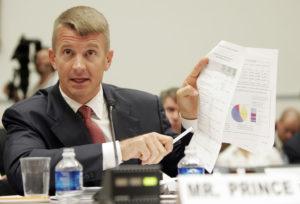
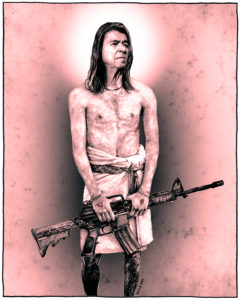
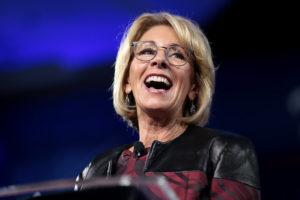
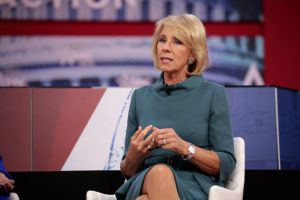

You need to be a supporter to comment.
There are currently no responses to this article.
Be the first to respond.